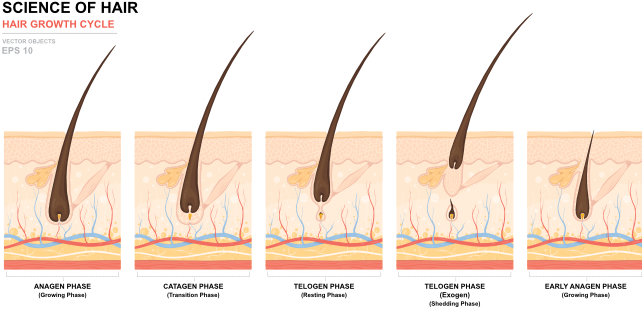All through recorded historical past, our hair and nails performed an vital position in signifying who we’re and our social standing. You could possibly say, they separate the caveman from businessman.
It was no shock then that many people discovered a brand new degree of appreciation for our hairdressers and nail artists through the COVID lockdowns. Even Taylor Swift reported she lower her personal hair throughout lockdown.
So, what would occur if all this hair and nail grooming received an excessive amount of for us and we determined to offer all of it up. Would our hair and nails simply carry on rising?
The reply is sure. The hair on our head grows, on common, 1 centimeter per thirty days, whereas our fingernails develop a median of simply over 3 millimetres.
When left unchecked, our hair and nails can develop to spectacular lengths. Aliia Nasyrova, referred to as the Ukrainian Rapunzel, holds the world file for the longest locks on a dwelling girl, which measure an spectacular 257.33 cm.
In relation to record-breaking fingernails, Diana Armstrong from the US holds that file at 1,306.58 cm.
Most of us, nonetheless, get common haircuts and trim our nails – some with larger frequency than others. So why do some individuals’s hair and nails develop extra rapidly?
Remind me, what are they made out of?
Hair and nails are made principally from keratin. Each develop from matrix cells beneath the pores and skin and develop by totally different patterns of cell division.
Nails develop steadily from the matrix cells, which sit underneath the pores and skin on the base of the nail. These cells divide, pushing the older cells ahead. As they develop, the brand new cells slide alongside the nail mattress – the flat space underneath the fingernail which seems pink due to its wealthy blood provide.
A hair additionally begins rising from the matrix cells, finally forming the seen a part of the hair – the shaft. The hair shaft grows from a root that sits underneath the pores and skin and is wrapped in a sac referred to as the hair follicle.
This sac has a nerve provide (which is why it hurts to drag out a hair), oil-producing glands that lubricate the hair and a tiny muscle that makes your hair arise when it is chilly.
On the follicle’s base is the hair bulb, which accommodates the all-important hair papilla that provides blood to the follicle.
Matrix cells close to the papilla divide to supply new hair cells, which then harden and type the hair shaft. As the brand new hair cells are made, the hair is pushed up above the pores and skin and the hair grows.
However the papilla additionally performs an integral half in regulating hair development cycles, because it sends alerts to the stem cells to maneuver to the bottom of the follicle and type a hair matrix. Matrix cells then get alerts to divide and begin a brand new development section.
Not like nails, our hair grows in cycles
Scientists have recognized 4 phases of hair development, the:
- anagen or development section, which lasts between two and eight years
- catagen or transition section, when development slows down, lasting round two weeks
- telogen or resting section, when there isn’t any development in any respect. This normally lasts two to a few months
- exogen or shedding section, when the hair falls out and is changed by the brand new hair rising from the identical follicle. This begins the method once more.

- Hair development cycle. (Iv__design/Getty Photos)
Every follicle goes by this cycle 10–30 occasions in its lifespan.
If all of our hair follicles grew on the similar fee and entered the identical phases concurrently, there could be occasions once we would all be bald. That does not normally occur: at any given time, just one in ten hairs is within the resting section.
Whereas we lose about 100–150 hairs each day, the typical individual has 100,000 hairs on their head, so we barely discover this pure shedding.
So what impacts the velocity of development?
Genetics is probably the most important issue. Whereas hair development charges range between people, they are usually constant amongst relations.
Nails are additionally influenced by genetics, as siblings, particularly similar twins, are likely to have comparable nail development charges.

However there are additionally different influences.
Age makes a distinction to hair and nail development, even in wholesome individuals. Youthful individuals usually have quicker development charges due to the slowing metabolism and cell division that comes with ageing.
Hormonal adjustments can have an effect. Being pregnant usually accelerates hair and nail development charges, whereas menopause and excessive ranges of the stress hormone cortisol can sluggish development charges.
Vitamin additionally adjustments hair and nail energy and development fee. Whereas hair and nails are made principally of keratin, in addition they include water, fat and varied minerals. As hair and nails continue to grow, these minerals must be changed.
That is why a balanced weight loss plan that features ample vitamins to help your hair and nails is crucial for sustaining their well being.

Nutrient deficiencies could contribute to hair loss and nail breakage by disrupting their development cycle or weakening their construction. Iron and zinc deficiencies, for instance, have each been linked to hair loss and brittle nails.
This may occasionally clarify why thick hair and robust, well-groomed nails have lengthy been related to notion of excellent well being and excessive standing.
Nonetheless, not all perceptions are true.
No, hair and nails do not develop after dying
A persistent fantasy that will relate to the legends of vampires is that hair and nails proceed to develop after we die.
In actuality, they solely seem to take action. Because the physique dehydrates after dying, the pores and skin shrinks, making hair and nails appear longer.
Morticians are effectively conscious of this phenomenon and a few inject tissue filler into the deceased’s fingertips to minimise this impact.
So, plainly dwelling or lifeless, there isn’t any escape from the unending process of caring for our hair and nails.![]()
Michelle Moscova, Adjunct Affiliate Professor, Anatomy, UNSW Sydney
This text is republished from The Dialog underneath a Inventive Commons license. Learn the authentic article.

